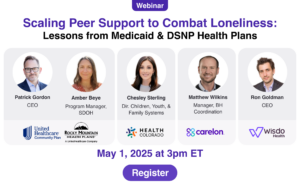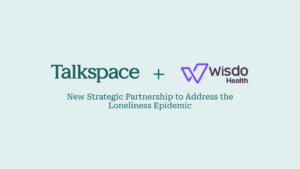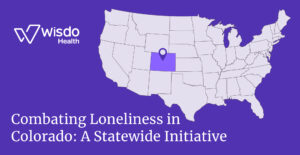This January, I chose to join the committed team at Wisdo Health as Board Director to help the company achieve its mission of changing social health in America.
Wisdo aims to reduce the alarming rates of social isolation and loneliness, making it one of today’s most important priorities in healthcare. Addressing loneliness and social isolation needs to be a top priority for employers, as well.
The truth about loneliness in the workplace
Loneliness is defined as a subjective, unwelcome feeling of lack or loss of companionship and social support. Compared to the 20% who suffer from mental health disorders [1] or 10% that suffer from diabetes [2], loneliness affects 58% of employees, making it the largest unaddressed condition in the workplace [3].
Loneliness has also been found to negatively impact the following:
- employee engagement and productivity
- utilization of clinical services
- medical costs
- existing chronic physical and mental health conditions.
It particularly affects underrepresented racial groups and younger employees: 75% of Hispanics, 68% of Blacks, and 79% of 18 to 24-year-old adults [4]. Unfortunately, rates continue to rise each year due to the increase in remote work, decrease in mental health, increase in life stressors, and lack of health equity.
According to a study by McKinsey in 2021 on the “Big Resignation” [5], it’s also why employers have seen more abrupt resignations than ever before. The lack of a “sense of belonging” and access to “trusted and caring teammates,” and not feeling “valued by the organization,” were named as the most important drivers of employee engagement and satisfaction.
Given the devastating impact of loneliness and lack of social support, this has become both a health and economic concern.
We require a strategy that can reduce loneliness, increase social support and quality of life, and help employees navigate to the right benefits at the right time to also help reduce avoidable medical costs.
The benefits of peer support
Over my career as an HR executive and as the CEO of Business Group on Health, I’ve seen hundreds of digital solutions addressing both mental and physical health conditions. What I haven’t seen is a solution that specifically addresses loneliness. The Wisdo team has created a peer support platform that’s proven to reduce loneliness and social isolation measures with a scalable, cost-effective, and evidence-based approach.
This increase in quality of life and engagement has both clinical and financial impacts.
With improved mental health and reduced loneliness and social isolation, Wisdo has experienced a 31% success rate of referring engaged employees to integrated benefits [5] and a 40%+ engagement rate with the platform 12 months after joining, delivering an ROI.
A call to all employers
The goal of a workforce strategy is to deploy the most engaged, productive, and competitive workforce possible. Integral to that strategy is the health and well-being of employees. There is a loneliness epidemic in the workplace. Left unaddressed, this creates challenges to organizational effectiveness as well as the commercial healthcare market.
Addressing the loneliness epidemic with evidence-based solutions like Wisdo Health can help bring timely relief to employee health and inflationary cost increases while delivering improvements to company culture.
The time for supporting loneliness and social isolation is now. Please join me in the continued support of this mission.
If you’d like to hear more about Wisdo Health, please reach out to me, join a future webinar, or share your contact information with inquiry@wisdo.com.










